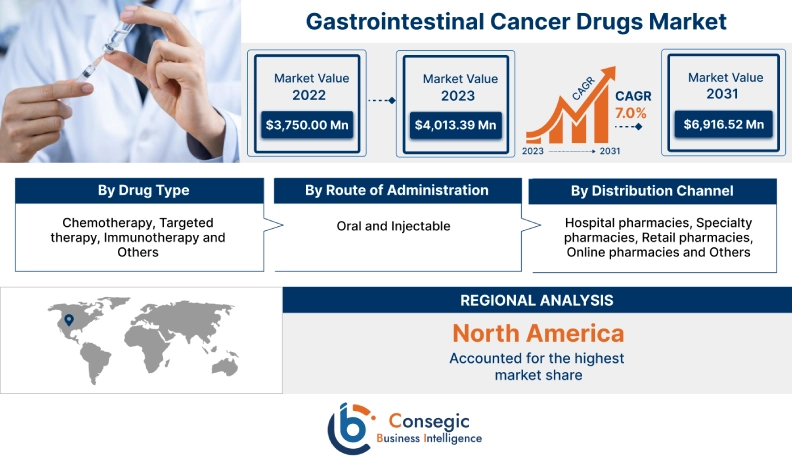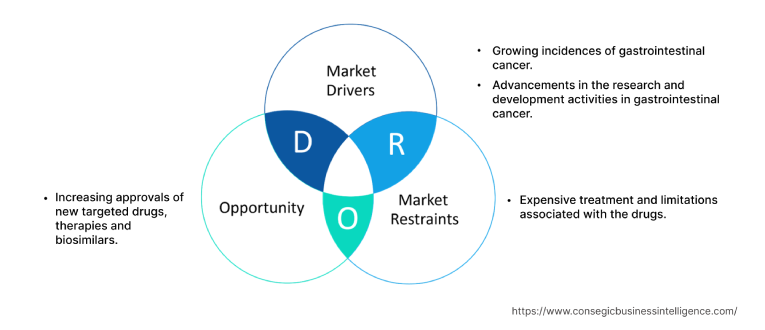Gastrointestinal Cancer Drugs Market Introduction :
Consegic Business Intelligence analyzes that the gastrointestinal cancer drugs market is growing with a CAGR of 7.0% during the forecast period (2023-2031). The market accounted for USD 3,750.00 million in 2022 and USD 4,013.39 million in 2023, and the market is projected to be valued at USD 6,916.52 million by 2031.
Gastrointestinal Cancer Drugs Market Definition & Overview:
Gastrointestinal cancer is a malignancy that originates when the cells lining the digestive tract start to grow uncontrollably. Gastrointestinal (GI) cancer includes all cancers in the digestive tract organs such as the stomach, large and small intestine, colon, rectum and anus. Gastroesophageal junction adenocarcinoma (GEJ), gastrointestinal stromal tumors (GIST), colorectal cancer, and primary gastric lymphoma are common types of gastrointestinal cancers based on their origin in the digestive tract. Sedentary lifestyle, poor diet habits, obesity, gastroesophageal reflux, Helicobacter pylori infection, smoking, and genetic alterations are the important risk factors for gastrointestinal cancer.
Based on the stage and type of gastrointestinal cancer several drugs are used. These drugs can be used individually or can be introduced in combination with other drugs. Some common drugs and their classes include chemotherapy drugs, targeted therapy, and immunotherapy. Various chemotherapy drugs like 5-FU (fluorouracil), capecitabine, carboplatin, cisplatin, docetaxel can be used in combination to target therapy to treat cancer cells and prevent tumor growth. Targeted drugs use specific molecules involved in cancer whereas immunotherapy uses one's immune system to fight cancer. Trastuzumab is an FDA-approved targeted therapy for stomach cancer whereas pembrolizumab is an immunotherapy drug recently approved by FDA to treat certain patients with advanced gastrointestinal cancer.
Gastrointestinal Cancer Drugs Market Insights :
Gastrointestinal Cancer Drugs Market Dynamics - (DRO) :
Key Drivers :
Growing incidences of gastrointestinal cancer
The gastrointestinal cancer drugs market is driven worldwide by growth in the prevalence of gastrointestinal cancer. According to data published by WHO in July 2023, colorectal cancer is the third most common cancer type worldwide and gastric carcinoma is the fifth most common malignancy worldwide. Gastric cancer is the 4th most common cancer in men and the 7th most common cancer in women. In 2020, almost 2 million cases of colon cancer were diagnosed.
Gastrointestinal cancer begins when cells lining the digestive tract start to grow uncontrollably. Dietary changes, sedentary lifestyle, smoking, alcoholism, obesity, and gastroesophageal reflux all act as risk factors for gastrointestinal cancer. Gastrointestinal cancer is one of the leading causes of cancer-related deaths. According to the report published by the Global Cancer Observatory in December 2020 report, 1.089103 million cases of gastric cancer were reported worldwide, and the mortality of gastric cancer was 7.7% of all cancer mortalities. Therefore, an increase in disease burden is an important driving factor for the gastrointestinal cancer drug market.
Advancements in the research and development activities in gastrointestinal cancer
Advancements and improvements in research and development activities is driving the gastrointestinal cancer drugs market. Government initiatives to eliminate cancer, patent expiry of drugs, approval of new targeted therapies and awareness in public is encouraging more research in gastrointestinal cancer.
The application of minimally invasive techniques for gastrointestinal cancer has been slowly increasing. It is proving to be both technically and oncologically safe and currently, it is the important point for more advanced research in the gastrointestinal cancer drugs market. Additionally, the recent approvals for targeted therapies is driving the gastrointestinal cancer drug market. For instance, on June 9, 2023, Astellas Pharma Inc, announced they have filed a new drug application saying that Zolbetuximab, a monoclonal antibody targeting claudin-18 isoform 2 (CLDN18.2), has shown efficacy in patients with CLDN18.2-positive, human epidermal growth factor receptor 2 (HER2)-negative, metastatic gastric or gastro-oesophageal junction adenocarcinoma. As a result, advancements in the research and development activities in gastrointestinal cancer is boosting the demand of the market.
Key Restraints :
Expensive treatment and limitations associated with the drugs
The high cost of drug development and treatment along with the adverse side effects of gastrointestinal cancer drug therapies is the substantial factor that confines the growth of the gastrointestinal cancer drug market.
The cost of anticancer drugs continues to upsurge. Multiple factors contribute to the high cost of drug development and the cost of gastrointestinal cancer treatment. For instance, according to data published by the Congressional Budget Office (CBO) in April 2021, estimates of the average R&D cost per new drug range from less than $1 billion to more than $2 billion per drug.
Furthermore, gastric cancer drugs have to undergo various research and clinical trials before public launches, this process is time-consuming and often requires a large amount of investment. Also, the limitations associated with gastrointestinal cancer drugs hamper the growth of the market. Moreover, targeted laser and radiation therapy along with surgery are also gaining importance for the treatment of gastrointestinal cancer. Targeted radiation can substantially shrink tumors and destroy cancer cells in nearby lymph nodes thereby reducing the possibility of metastasis of cancer. It restricts the cancer in its early stages and prevents it from growing to its advanced stages. These novel techniques have decreased side effects, duration of hospitalization, sedation requirements, and reduced the effects on other body parts.
Thus, as a result despite the growing number of fundamental investigations into gastric cancer above mentioned reasons are restraining the gastrointestinal cancer drug market.
Future Opportunities :
Increasing approvals of new targeted drugs, therapies and biosimilars
The increasing prevalence of gastrointestinal cancer is enhancing the research and development activities in gastrointestinal cancer drugs. The approval of new targeted drugs, therapies, and biosimilars is the potential opportunity to fuel the gastric cancer market. For instance, In January 2023, the Food and Drug Administration (FDA) approved the combination of two targeted drugs, tucatinib (Tukysa) and trastuzumab (Herceptin) for people with advanced colorectal cancer that produces an excess amount of a protein called HER2. Additionally, regulatory agencies around the world—including the Food and Drug Administration (FDA), and the European Medicines Agency (EMA) have already approved a few biosimilars in the field of oncology.
Biosimilar is a medicine that is highly similar in structure and function to the already approved biological medicine. For example, Ogivri (trastuzumab-dkst) as a biosimilar to Herceptin (trastuzumab) is approved by USFDA. Furthermore, in September 2023 the European medicines agency's (EMA) Committee for Medicinal Products for Human Use (CHMP) issued a positive opinion recommending marketing authorization of EirGenix's biosimilar for trastuzumab (Herceptin) for the treatment of patients with HER2-positive metastatic gastric cancers. Significantly the high potential of biosimilars will eventually lower the cost of cancer treatment in the future. Thus, there is a good possibility that these targeted drugs, therapies, and biosimilars will bring opportunities for gastrointestinal cancer market growth in the near future.
Gastrointestinal Cancer Drugs Market Report Insights :
| Report Attributes | Report Details |
| Study Timeline | 2017-2031 |
| Market Size in 2031 | USD 6,916.52 Million |
| CAGR (2023-2031) | 7.0% |
| By Drug Type | Chemotherapy, Targeted therapy, Immunotherapy and Others |
| By Route of Administration | Oral and Injectable |
| By Distribution Channel | Hospital pharmacies, Specialty pharmacies, Retail pharmacies, Online pharmacies and Others |
| By Region | North America, Europe, Asia-Pacific, Latin America, and Middle East & Africa |
| Key Players | Merck & Co, AstraZeneca, Biocon, Novartis Pharmaceuticals Corporation, F. Hoffmann-La Roche Ltd, Mylan N.V., Bristol-Myers Squibb Company., Pfizer Inc., Eli Lilly and Company, Celltrion Healthcare Co. Ltd., BeiGene, Inc., Amgen Inc., Teva Pharmaceutical Industries Ltd. West Pharmaceutical Services, Inc., Corning Incorporated and Seagen Inc. |
| Geographies Covered | |
| North America | U.S. Canada Mexico |
| Europe | U.K. Germany France Spain Italy Russia Benelux Rest of Europe |
| APAC | China South Korea Japan India Australia ASEAN Rest of Asia-Pacific |
| Middle East and Africa | GCC Turkey South Africa Rest of MEA |
| LATAM | Brazil Argentina Chile Rest of LATAM |
| Report Coverage | Revenue Forecast, Competitive Landscape, Growth Factors, Restraint or Challenges, Opportunities, Environment & Regulatory Landscape, PESTLE Analysis, PORTER Analysis, Key Technology Landscape, Value Chain Analysis, Cost Analysis, and Regional Trends & Forecast |
Gastrointestinal Cancer Drugs Market Segmental Analysis :
Based on the Drug Type :
The drug type is categorized into chemotherapy, targeted therapy, immunotherapy, and others. In 2022, chemotherapy segment accounted for the highest market share of in the gastrointestinal cancer drug market. Chemotherapy is a type of cancer treatment that uses cytotoxic drugs to treat the cancer cells. Various chemotherapy drugs like 5-FU (fluorouracil), capecitabine, carboplatin, cisplatin, docetaxel, luoropyrimidine, platinum, taxanes, and irinotecan are still used as first-line therapy to treat advanced gastrointestinal cancer cells and prevent the tumor growth. These drugs are used both individually and in combination with other drugs. Additionally, new chemotherapy drug launches accounted for the growth of the chemotherapy segment. For instance, in April 2021, the Food and Drug Administration approved the nivolumab drug launched by Bristol-Myers Squibb, nivolumab in combination with fluoropyrimidine- and platinum-containing chemotherapy for advanced or metastatic gastric cancer, gastroesophageal junction cancer, and esophageal adenocarcinoma.
Moreover, the targeted therapy segment is expected to hold the highest CAGR over the forecast period. Targeted therapy uses drugs to identify and attack the molecules and pathways specifically involved in the cancer. Several types of targeted therapies for cancers, such as gene expression modulators, hormone therapies, apoptosis inducers, angiogenesis inhibitors, and signal transduction inhibitors are available in the market. Furthermore, the rising focus of companies on developing novel drugs and therapies for treating gastrointestinal cancer, coupled with increasing product launches, are expected to boost the market growth over the forecast period. For instance, in August 2023, from the results of an international phase 3 clinical trial, done in participation with Weill Cornell Medicine and NewYork-Presbyterian, it was found that a new targeted treatment called zolbetuximab, given in combination with standard chemotherapy, extended survival for patients with advanced gastric cancer that overexpressed a specific biomarker. These results have prompted the USFDA to grant priority review to the manufacturer's biologic license application and set January 12, 2024, as the target decision date.
Based on the Route of Administration :
By route of administration gastrointestinal cancer drugs market is categorized into oral drugs and injectable drugs. In 2022, injectable drugs segment accounted for the highest market share in the gastrointestinal cancer drug market and is expected to grow with the CAGR in the forecast period. Several injectable drugs are typically administered intravenously and subcutaneously in the body for the treatment of cancer. Most of the chemotherapy drugs, targeted drugs, and immunotherapy drugs are available in injectable form, leading to the dominance of this segment. Intravenous administration of drugs increases the bioavailability of drugs and also improves patient safety. Moreover, increasing advances in technology for injectable drugs is fueling the growth of this segment. For instance, in January 2022, West Pharmaceuticals announced a collaboration with Corning Incorporated in pharmaceutical injectable drug delivery. Corning's valor glass technology will be expanded to enable enhanced injectable drug packaging and delivery systems for the pharmaceutical industry as part of the new collaboration, to improve patient safety and broaden access to life-saving therapies.
Based on the Distribution Channel :
By distribution channel gastrointestinal cancer drugs market is categorized into hospital pharmacies, specialty pharmacies, retail pharmacies, online pharmacies, and others. In 2022, hospital pharmacies segment accounted for the highest market share of 38.81% in the gastric cancer drug market and is expected to grow with the CAGR over the forecast period. Cancer drugs are available in hospital pharmacies only as they need to be stored and sold under special conditions. Moreover, these drugs are not allowed to be sold without a prescription and they need to be administered by specialists with proper care. Moreover, the increasing number of hospitals in developing countries is driving the segment. For instance, according to the report by Investment Information and Credit Rating Agency, in August 2023, the hospital sector is driving a robust revenue growth of 8-10% in FY24, with an operating profit margin of 22-23%. This will boost the distribution of cancer drugs in the hospital pharmacies.
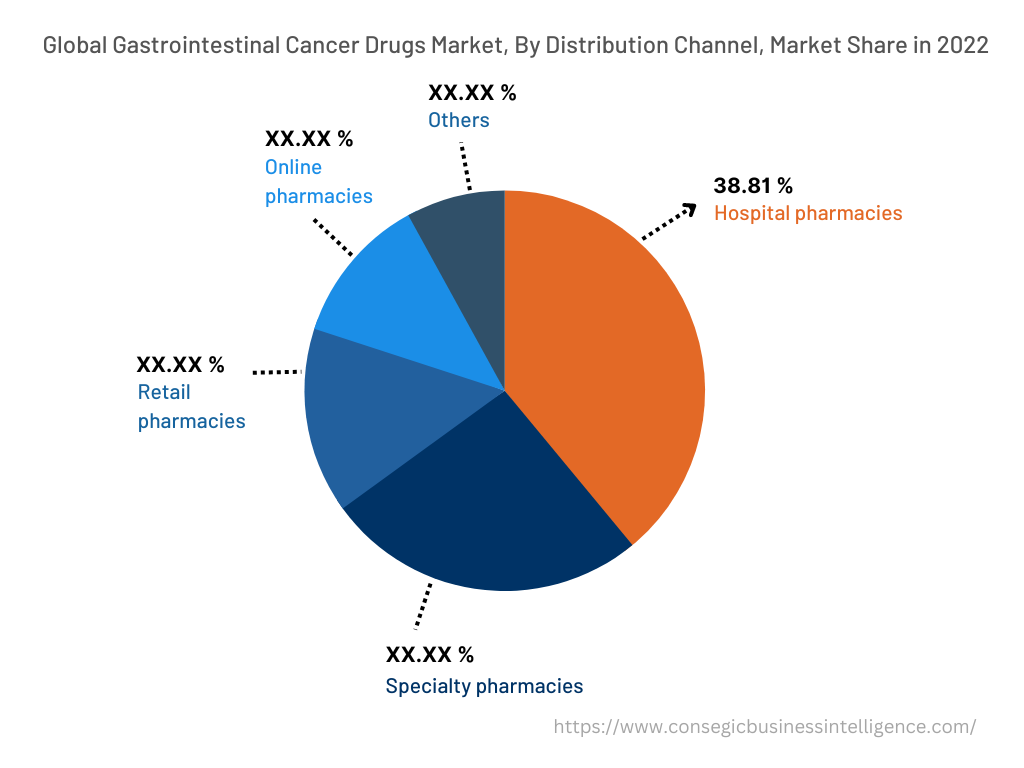
Based on the Region :
The regional segment includes North America, Europe, Asia Pacific, Middle East and Africa, and Latin America.
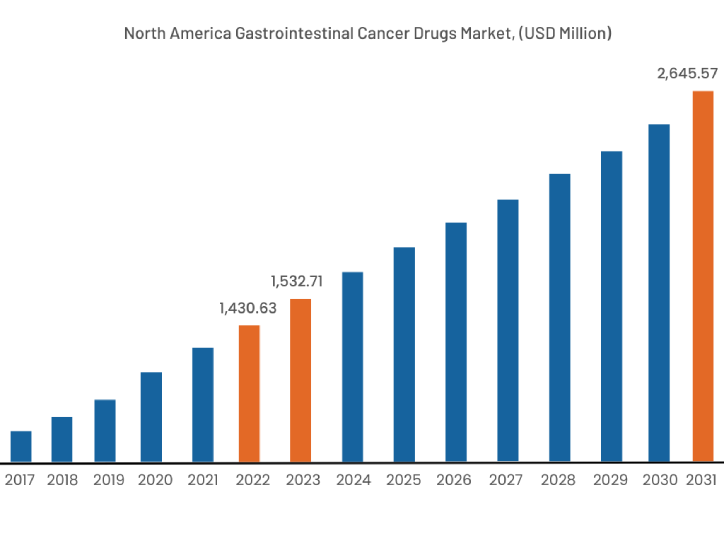
In 2022, North America accounted for the highest market share at 38.15% valued at USD 1,430.63 million in 2022 and USD 1,532.71 million in 2023, it is expected to reach USD 2,645.57 million in 2031. In the North America region, the U.S. accounted for the dominant market share of 65.70% in the year 2020. This is due to the new product launches and the increase in research activities by leading companies. For instance, in June 2023, Astellas Pharma Inc. filed a New Drug Application saying that, Zolbetuximab, a monoclonal antibody targeting claudin-18 isoform 2 (CLDN18.2), has shown efficacy in patients with CLDN18.2-positive, human epidermal growth factor receptor 2 (HER2)-negative, metastatic gastric or gastro-oesophageal junction adenocarcinoma. Moreover, in February 2023 AstraZeneca and KYM Biosciences Inc. entered into a global exclusive license agreement for CMG901 which is a potential antibody drug conjugate (ADC) targeting Claudin 18 isoform 2. Under the license agreement, AstraZeneca will be responsible for the research, development, manufacture, and commercialization of CMG901 globally. Thus, the new product launches and increase in research activities by leading companies are collectively boosting the market for gastrointestinal cancer drugs across the North America region and creating lucrative growth opportunities for the gastrointestinal cancer drugs market in North America.
Furthermore, the Asia Pacific region is expected to witness significant growth over the forecast period, growing at a CAGR of 7.4% during 2024-2031. This is mainly due to the higher prevalence of gastrointestinal cancer in this region. According to the report published by and Global Cancer Observatory in December 2020, of all gastric cancer cases, 60% were observed in Eastern Asia, 43.9% in China, and 56.6% of all global deaths occurring in Eastern Asia, with 48.6% of all global deaths occurring in China alone. Incidence rates were highest in males in Japan (48.1), Mongolia (47.2), and the Republic of Korea (39.7). Thus, the high prevalence of gastrointestinal cancer across the region is driving the demand for gastrointestinal cancer drugs across Asia Pacific.
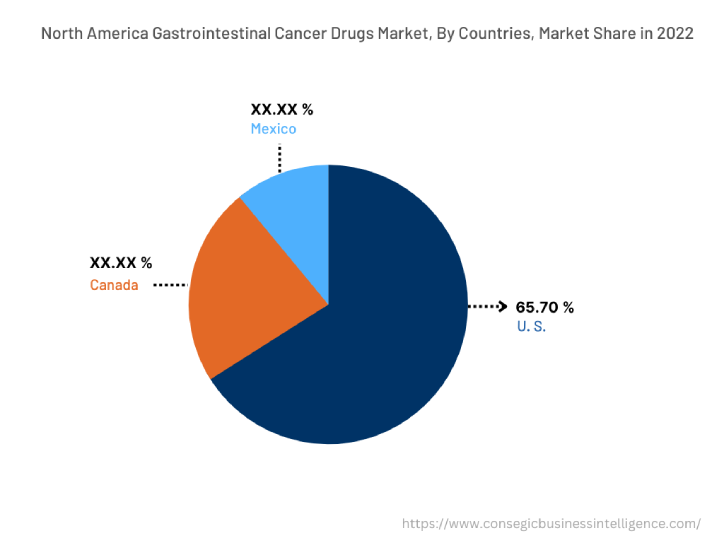
Top Key Players & Market Share Insights:
The gastrointestinal cancer drug market is highly competitive, with several large players and numerous small and medium-sized enterprises. These companies have strong research and development capabilities and a strong presence in the market through their extensive product portfolios and distribution networks. The market is characterized by intense competition, with companies focusing on expanding their product offerings and increasing their market share through mergers, acquisitions, and partnerships. The key players in the market include-
- Merck & Co
- Astellas Pharma Inc
- Eli Lilly and Company
- Celltrion Healthcare Co. Ltd.
- Teva Pharmaceutical Industries Ltd.
- Seagen Inc.
- West Pharmaceutical Services, Inc.
- Corning Incorporated
- Biocon
- AstraZeneca
- Novartis Pharmaceuticals Corporation
- F. Hoffmann-La Roche Ltd
- Mylan N.V.
- BeiGene, Inc.
- Bristol-Myers Squibb Company.
- Amgen Inc.
- Pfizer Inc.
Recent Industry Developments :
- On July 2023, Astellas Pharma Inc. announced the European Medicines Agency (EMA) has accepted for regulatory review the company's marketing authorization application (MAA) for zolbetuximab, which is a monoclonal antibody targeting claudin-18 isoform 2 (CLDN18.2), for first-line treatment of patients with locally advanced unresectable or metastatic HER2-negative gastric or gastroesophageal junction (GEJ) adenocarcinoma with CLDN18.2-positive tumor.
- In February 2023, AstraZeneca and KYM Biosciences Inc. announced partnership for CMG901 which is a potential antibody drug conjugate (ADC) targeting Claudin 18 isoform 2. Under the license agreement, AstraZeneca will be responsible for the research, development, manufacture and commercialization of CMG901 globally.
- In August 2023, Merck & Co announced that, the European Commission (EC) has approved KEYTRUDA in combination with trastuzumab, fluoropyrimidine- and platinum-containing chemotherapy, for the first-line treatment of locally advanced unresectable or metastatic HER2-positive gastric or GEJ adenocarcinoma in adults whose tumors express PD-L1.
- In March 2023, Pfizer Inc. announced acquisition of a Seagen, a global biotechnology company that discovers, develops and commercializes transformative cancer medicines, for USD 229 in cash per Seagen share for a total enterprise value of USD 43 billion.
Key Questions Answered in the Report
What is the market size of the gastrointestinal cancer drugs industry in 2023? +
In 2023, the market size of gastric cancer drugs is USD 3,750.00 million.
What will be the potential market valuation for the gastrointestinal cancer drugs industry by 2031? +
In 2031, the market size of gastrointestinal cancer will be expected to reach USD 6,916.52 million.
What are the key factors driving the growth of the gastrointestinal cancer drugs market? +
Growing incidences of gastrointestinal cancer across the globe is fueling market growth at the global level.
What is the dominating segment in the gastrointestinal cancer drugs market by distribution channel? +
In 2022, the hospital pharmacies segment accounted for the highest market share of 38.81% in the overall gastrointestinal cancer drugs market.
Based on current market trends and future predictions, which geographical region is growing at the fastest CAGR over the forecast period in the gastrointestinal cancer drugs market? +
Asia Pacific region accounted for the highest CAGR in the overall gastrointestinal cancer drugs market.
